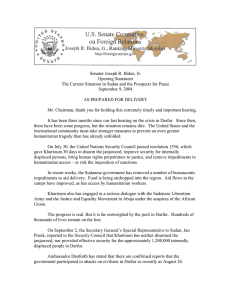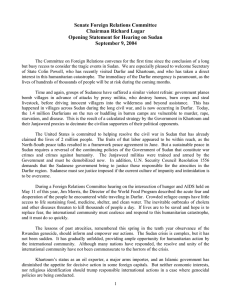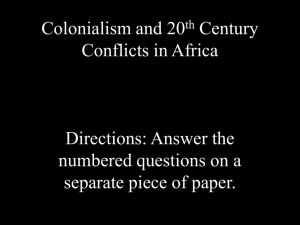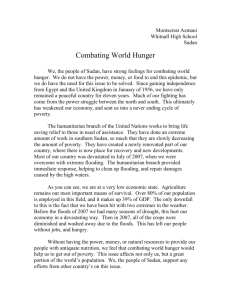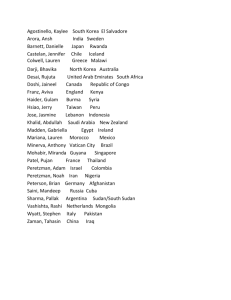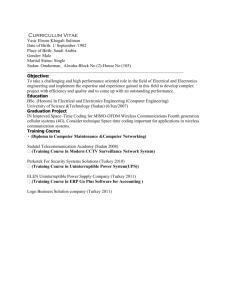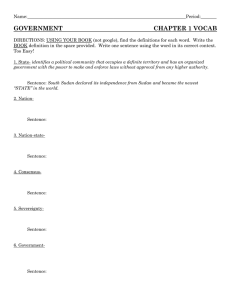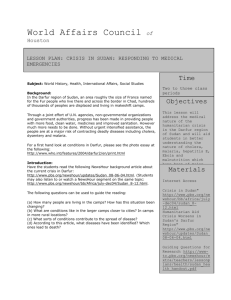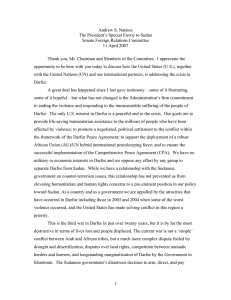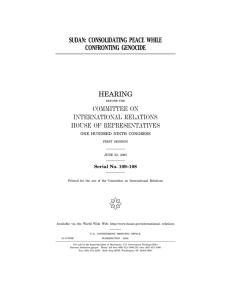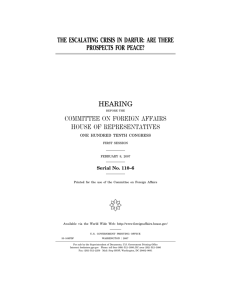Senate Committee on Foreign Relations Chairman Richard G. Lugar Opening Statement for
advertisement
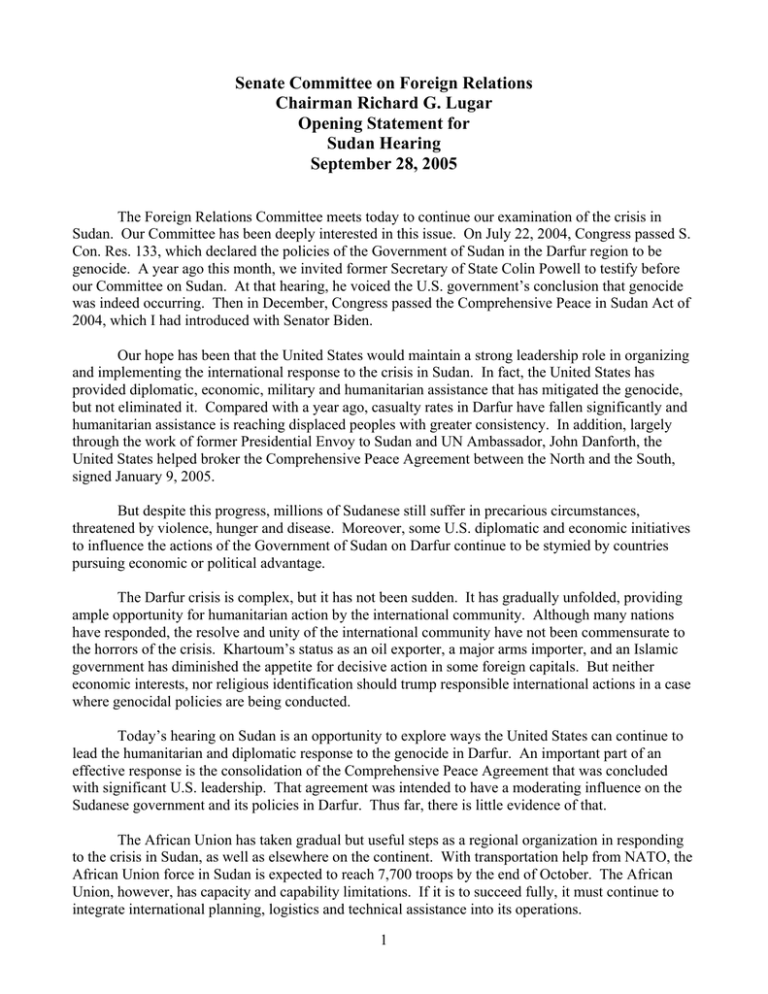
Senate Committee on Foreign Relations Chairman Richard G. Lugar Opening Statement for Sudan Hearing September 28, 2005 The Foreign Relations Committee meets today to continue our examination of the crisis in Sudan. Our Committee has been deeply interested in this issue. On July 22, 2004, Congress passed S. Con. Res. 133, which declared the policies of the Government of Sudan in the Darfur region to be genocide. A year ago this month, we invited former Secretary of State Colin Powell to testify before our Committee on Sudan. At that hearing, he voiced the U.S. government’s conclusion that genocide was indeed occurring. Then in December, Congress passed the Comprehensive Peace in Sudan Act of 2004, which I had introduced with Senator Biden. Our hope has been that the United States would maintain a strong leadership role in organizing and implementing the international response to the crisis in Sudan. In fact, the United States has provided diplomatic, economic, military and humanitarian assistance that has mitigated the genocide, but not eliminated it. Compared with a year ago, casualty rates in Darfur have fallen significantly and humanitarian assistance is reaching displaced peoples with greater consistency. In addition, largely through the work of former Presidential Envoy to Sudan and UN Ambassador, John Danforth, the United States helped broker the Comprehensive Peace Agreement between the North and the South, signed January 9, 2005. But despite this progress, millions of Sudanese still suffer in precarious circumstances, threatened by violence, hunger and disease. Moreover, some U.S. diplomatic and economic initiatives to influence the actions of the Government of Sudan on Darfur continue to be stymied by countries pursuing economic or political advantage. The Darfur crisis is complex, but it has not been sudden. It has gradually unfolded, providing ample opportunity for humanitarian action by the international community. Although many nations have responded, the resolve and unity of the international community have not been commensurate to the horrors of the crisis. Khartoum’s status as an oil exporter, a major arms importer, and an Islamic government has diminished the appetite for decisive action in some foreign capitals. But neither economic interests, nor religious identification should trump responsible international actions in a case where genocidal policies are being conducted. Today’s hearing on Sudan is an opportunity to explore ways the United States can continue to lead the humanitarian and diplomatic response to the genocide in Darfur. An important part of an effective response is the consolidation of the Comprehensive Peace Agreement that was concluded with significant U.S. leadership. That agreement was intended to have a moderating influence on the Sudanese government and its policies in Darfur. Thus far, there is little evidence of that. The African Union has taken gradual but useful steps as a regional organization in responding to the crisis in Sudan, as well as elsewhere on the continent. With transportation help from NATO, the African Union force in Sudan is expected to reach 7,700 troops by the end of October. The African Union, however, has capacity and capability limitations. If it is to succeed fully, it must continue to integrate international planning, logistics and technical assistance into its operations. 1 We look forward to learning the estimates of our witnesses about the effectiveness of the current mandate for the African Union and the prospects for an expansion of that mandate. We also expect to hear what further role the UN and NATO can play in assisting in Darfur security. It is clear that the civilian population and humanitarian groups must be better protected from attacks by militias and rebels. I am encouraged by the stability following the recent tragic death of the First Vice President, Dr. John Garang, in a helicopter crash. An international investigation will report on the causes of the crash, but preliminary reports indicate that it probably was an accident. Dr. Garang was instrumental in concluding the peace agreement, and his successors must sustain his decades-long commitment to Sudan by building a durable peace that brings economic development. We are very pleased today to be joined by two good friends of the Committee who speak with knowledge and authority about U.S. efforts in Sudan. First, we will hear from Deputy Secretary of State Robert Zoellick. He will discuss the overarching U.S. approach to peace and stability across Sudan. The Administration has stated unequivocally that a resolution in Darfur is essential if there is to be an improvement in relations with the Sudanese government. I am encouraged by Secretary Zoellick’s personal engagement in Sudan and his naming of a special representative, Roger Winter, to help resolve the crisis in Darfur. Even as we focus on Darfur, we must be cognizant that simmering disputes in the East and the South remain a threat to the Comprehensive Peace Agreement. On our second panel, we will hear from General James Jones, Supreme Allied Commander Europe. Under General Jones’ leadership, EUCOM has established constructive ties with numerous African militaries and begun a process of improving regional cooperation. The North Atlantic Council tasked General Jones with supporting the efforts of the African Union in Sudan. He has skillfully applied NATO’s airlift capacity and other technical assistance to the endeavor, and worked with other international partners to ensure the delivery of security resources to the region. We are interested in the lessons learned through this mission, but also the opportunities that such assistance gives for mutually reinforcing the common goal of peace and stability. We are also eager to hear about EUCOM’s role in building cooperative security in the region, such as in Chad. I thank our distinguished witnesses, and we look forward to an insightful discussion on Sudan and Darfur. ### 2
